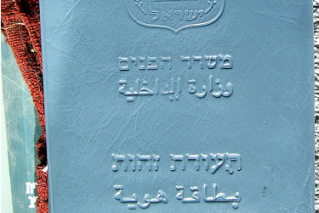 ID Card, photo CC by Zeevveez (Flickr)
ID Card, photo CC by Zeevveez (Flickr)In a petition submitted to the High Court of Justice on 7 April 2011, HaMoked: Center for the Defense of the Individual and the Association for Civil Rights in Israel (ACRI) demanded that the Ministry of Interior will stop revoking permanent residency permits issued to Palestinian residents of East Jerusalem.
The organizations further requested that the law be amended to provide special protection clauses for those who reside in areas that were annexed by the State of Israel (currently East Jerusalem and the Golan Heights) so that residents of these areas could exit and enter the country freely. Thus, a distinction would be made between immigrants who had acquired status in Israel for reasons such as marriage to an Israeli citizen, who would still be required to continuously prove that their center-of-life is here, and between residents of East Jerusalem and the Golan Heights who would be allowed to leave and return at will, as is the case with citizens.
Israeli law authorizes the Ministry of Interior to revoke the permit of a resident (native or immigrant) who left the country for a period of seven years or more, or who acquired citizenship or permanent license in another country, and thus had supposedly severed ties with Israel. The ministry regularly revokes residency permits without prior notice and without holding a hearing to allow residents to voice their arguments. In this manner, residents discover after the fact that they may no longer return to their homeland.
The majority of Palestinians in East Jerusalem are permanent residents of Israel, and the ongoing policy of permit revocation severely infringes on the basic human rights of tens of thousands who wish to leave Jerusalem for studies, work or marital purposes. In recent years, there has been a sharp rise in revocation of residency, and 2008 set a record with 4,577 revocations. Almost 50% of the total revocations of permits since the annexation of Jerusalem in 1967 occurred between the years 2006 to 2008. This sharp increase indicates a deliberate policy to reduce the number of Palestinians living in the city.
The petition was submitted on behalf of Mahmoud Qarae’en, a 26 year old resident of Silwan in East Jerusalem. Qarae’en must conduct his life knowing that any choice which means leaving Jerusalem for a protracted period of time – be it for residential or familial reasons or for the purpose of studying or working – may eventually cost him his residency permit. Acquiring citizenship or other residential status in a foreign country would involve the same punishment, meaning the loss of status and with it the loss of the possibility to return to his family, home, city, and birthplace.
To make matters worse, even a decision to relocate to an area near Jerusalem that is considered Occupied Territories by the Israeli authorities can be interpreted by the Ministry of Interior as immigration. Many Palestinians, and particularly women who marry West Bank residents, lose their residency status this way. They reside only a few miles from their place of birth, to which they may no longer return.
ACRI Attorney Oded Feller: “The current situation turns residents of East Jerusalem into prisoners, who are not allowed to leave their small and unfortunately neglected corner of the world. Today, more than ever before, a person who wishes to lead a full life in the 21st century may choose to relocate to another country for extended periods of time, without severing ties to his homeland and while maintaining the option to return at any time. It was Israel’s decision to annex these territories, and the state is obligated not to treat those living there as if they were immigrants or as if their ties to the country were questionable.”
Link to the petition (English): http://www.hamoked.org/files/2011/114270_eng.pdf








Pingback: Für die Opfer der Besatzung ist es unerheblich ob ein Besatzungskritiker des Antisemitismus beschuldigt wird | Stephanos Mavros
Pingback: Palestinians silently transferred from East Jerusalem | Jerusalem-ON.info
Pingback: Palestinians silently transferred from East Jerusalem « J. K. D'AMOURS
Pingback: Palestinians silently transferred from East Jerusalem « Silver Lining
Pingback: Militant Libertarian » Palestinians silently transferred from East Jerusalem
Pingback: FreeWestRadio.com » Blog Archive » Palestinians silently transferred from East Jerusalem